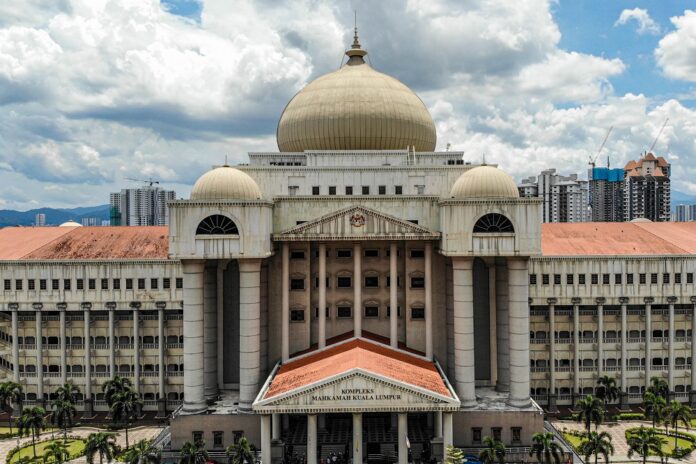An aerial view of the Kuala Lumpur High Court April 23, 2020. — Picture by Hari Anggara
KUALA LUMPUR, March 22 — A woman who was unilaterally converted to Islam when she was a child but grew up a Buddhist failed to get the High Court to restore her religious status legally today.
High Court judge Datuk Noorin Badaruddin said it was inappropriate for the civil courts to determine the validity of the conversion of any person, especially whether a person is a Muslim or not, as the matter fell under the jurisdiction of Shariah courts, and cited Article 121 of Federal Constitution to justify her decision.
Noorin also cited documentary evidence submitted in court over the course of hearing on the woman’s legal challenge and pointed out that the administrative procedure for those seeking to leave Islam has to go through the Islamic courts.
“One cannot unilaterally on her own accord, renounce the religion of Islam.
“As much as the applicant has the right to profess and practise the religion of her choice, she is for that matter not deprieved of legal remedy which is available for her to seek her release from Islam.
“The proper channel is the Shariah Court where under Section 61(3)(b)(x) of the Adminstration of the Religion of Islam (State of Selangor) Enactment 2003, the Shariah (High) Court is accorded with the jurisdiction to declare any person being no longer a Muslim.
“Thereafter she can proceed with the request to remove her name from the Registrar of Mualaf and make application to change her name and remove the word Islam from her IC.
“As such, the application by the applicant is dismissed with no order to cost,” the judge said when delivering her judgment of the judicial review via video conference.
Now aged 42, the woman, whose name is withheld to protect her privacy, was born in Singapore in 1980 to an ethnic Chinese couple who were both of the Buddhist faith back then.
According to documents filed in court previously by the woman who is now a Malaysian, her father embraced Islam in February 1990.
He unilaterally converted her to the same religion in October the same year and registered her with the Selangor Islamic Religious Department (Jais) as a Muslim when she was 10 years old, also giving her a new name.
However, the woman said that her mother did not become a Muslim, and had never given permission to the father to change their child’s religion from Buddhism to Islam. The couple later divorced in 1993.
The woman added that the Selangor Islamic Religious Council (Mais) did not ask her mother’s consent before registering her as a Muslim.
The woman said she has been a practising Buddhist since turning 18 in 1998 and is still living with her Buddhist mother.
The woman said she had never professed or practised the Islam faith and that she had never uttered the shahadah or the Muslim proclamation of faith when one embraces Islam.
She added that the National Registration Department (NRD) does not have records to show that she became a Muslim after turning 18.
On August 24, 2020, the woman said she renounced the name her father gave her when he unilaterally converted her to Islam, and made a statutory declaration in order to apply for a new MyKad to regain her birth name.
She added that she sought for the word “Islam” to be dropped from the replacement identity card.
On August 28, 2020, the woman applied at the NRD’s Ipoh branch in Perak for the replacement identity card, but said a counter officer refused to accept and process her application unless she could show an order to do so from the Shariah High Court.
After receiving no response from the NRD to an October 2020 letter of demand seeking for the new identity card, the woman filed a judicial review challenging the NRD director-general, the Malaysian government and Mais to restore her birth name and religion on November 12 that same year.
MORE TO COME



